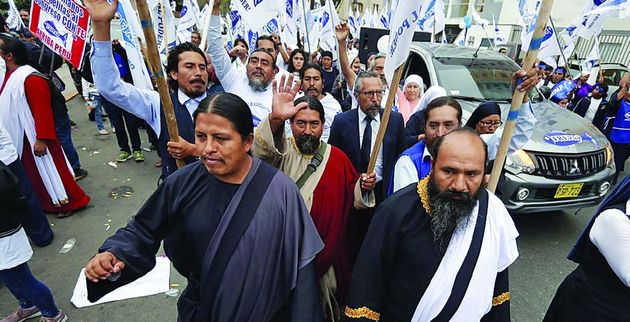Cultish ‘messianic’ party, second most voted in Peruvian elections
The FREPAP party combines distorted elements of Christianity and Incan traditions. Followers of the religious Andean cult believe that the founder Ezequiel Ataucusi, died in 2000, was the representation of Christ on Earth.
Evangélico Digital · LIMA · 07 FEBRUARY 2020 · 10:19 CET

On January 26, the parliamentary elections in Peru resulted in a fragmented parliament, in which no party won a majority.
The snap election was held because President Martín Vizcarra dissolved the Congress last September, arguing that “lawmakers were obstructing” his “anti-corruption agenda”.
According to the count by Ipsos, centrist Popular Action party won with 10.1% of the vote, while Popular Force, the party of Keiko Fujimori, dropped from the 36.3% of support in the 2016 election to only 7%.
FREPAP, SECOND MOST-VOTED PARTY
The biggest surprise of the elections was that the Agricultural People's Front of Peru (FREPAP in Spanish), with 8.9% of the votes, a millennialist party linked to rural religious cult.
The following options were the right-wing Podemos Peru (We can, Peru) party with 8.2%, and the centre-right Progress Alliance with 8%. The nationalist Union for Peru (UPP) also passed the 5% threshold necessary to enter Congress.
The new Congress will function for 14 months, until the scheduled presidential and legislative elections in April 2021.
SURPRISING RISE
The rise of FREPAP, the political arm of the religious group called the Israelite Mission of the New Universal Pact (AEMINPU in Spanish) was completely unexpected. Even the party leaders expressed their disbelief.
Carlos Ernesto Ráez, a Peruvian anthropologist who has studied in depth this political organization and the religious group that launched it, explained that “the Israelites”, as they are called in Peru, “did not plan to get second or third place nationally”.
But “16 seats is not a negligible number, if we take into account that all the benches have similar numbers (...) They have said that they will not make formal alliances with other political parties, but if they consider that there is a proposal that matches their agenda, they will not mind voting for it”, Ráez added.
RELIGION AND POLITICS
“It is not possible to understand FREPAP separated from the religious movement”, explained anthropologist Juan Ossio. Both were founded by Ezequiel Ataucusi Gamonal in 1968.
Both the religious followers of this movement and the FREPAP supporters, believe that founder Ataucusi was the representation of Christ on Earth. When he died in 2000, his followers placed his body in a glass casket and waited in vain for his resurrection.
To create their religion, they legally founded the Evangelical Association of the Israelite Mission of the New Universal Covenant (AEMINPU), which despite the name, has nothing to do with the evangelical church. Ataucusi had first joined an Adventist church in Lima, but then abandoned it to form his own church.
The political party was founded in 1989, also by Ataucusi, to make the preaching of the so-called “Israelites” more effective. They have nothing to do with Israel, but are called like that their fervor for the literalness of the Bible, their apparel with long robes, and their abundant hair and beards.
The political option of the cult was also created with the hope of having visibility, legislating in favor of their projects and not being on the margins of society.
“ANDEAN MESSIANISM”
According to Ossio, the ideology of FREPAP combines distorted elements of Christianity and Incan traditions. But the heart of its doctrine is in the worship of the image of the late leader Ezequiel Ataucusi Gamonal.
The anthropologist pointed out that behind this fervent worship of the founding leader is what he calls “Andean messianism”, a common feature in the societies of the Peruvian Andes, that can be traced to the uprisings of leaders like Tupac Amaru.
In an interview with the Peruvian website Ojo Público, Ossio explained that the growing power of Ataucusi also stood in the way of the Peruvian revolutionary organization Shining Path.
“They were people who sought truths that allowed them to overcome their sense of crisis. The alternative was between a movement that offered them the possibility of being the owners of wealth by taking it away from the owners […]; or finding order through a prophet who offered to reach the promised land, as long as they accepted the rules of his religion”, according to Ossio.
The expert underlined that “if this peaceful alternative had not existed, the followers of the Shining Path would have won”.
“The movement uses Incan motifs, such as the cooperative system, called ayllu, and a reinterpretation of the minka [community work for social benefit], an Andean political tradition of the Incas, who are seen by them as ancient prophets”.
Published in: Evangelical Focus - world - Cultish ‘messianic’ party, second most voted in Peruvian elections
